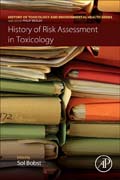
History of Risk Assessment in Toxicology guides the reader through the historical narrative of the evolution of risk assessment thinking in human and environmental practices. Risk assessment concepts are used in many different professional practice areas. In the health and environmental practices of risk assessment, the critical issue is often what chemical concentration in air, water, food, or a solid substance is acceptable, or considered not to result in any adverse effect. History of Risk Assessment in Toxicology reviews examples from early scientific and health studies to showcase the foundations of risk assessment. Exploring the development of risk assessment as practiced by major regulatory bodies such as the US Food and Drug Administration (FDA), the Occupational Safety & Health Administration (OSHA) and the US Environmental Protection Agency (EPA) will reveal how risk assessment has evolved in the 20th and 21st centuries. Modern technology has created opportunities in in silicon vitro, computational modeling, Omics, and big data techniques to assess the toxicity of chemicals while traditional approaches to risk assessment are being challenged with new and innovative approaches. Finally, current issues being debated and tested in risk assessment are outlined with possible future avenues suggested. Presents the first dedicated history on the evolution of risk assessment in toxicologyReviews the development of major US and EU regulatory bodiesProvides a context to current debates surrounding the future of risk assessment INDICE: 1. The prehistory of immunotoxicology 2. Focus on autoimmunity and hypersensitivity 3. Clinical immunotoxic effects4. Drug withdrawals caused by inacceptable immunotoxicity5. Pioneering inter-laboratory studies6. Regulatory aspects of immunotoxicology7. Immunotherapy of poisonings 8. Insights on the future of immunotoxicity evaluation
- ISBN: 978-0-12-809532-4
- Editorial: Academic Press
- Encuadernacion: Rústica
- Páginas: 125
- Fecha Publicación: 01/05/2017
- Nº Volúmenes: 1
- Idioma: Inglés
